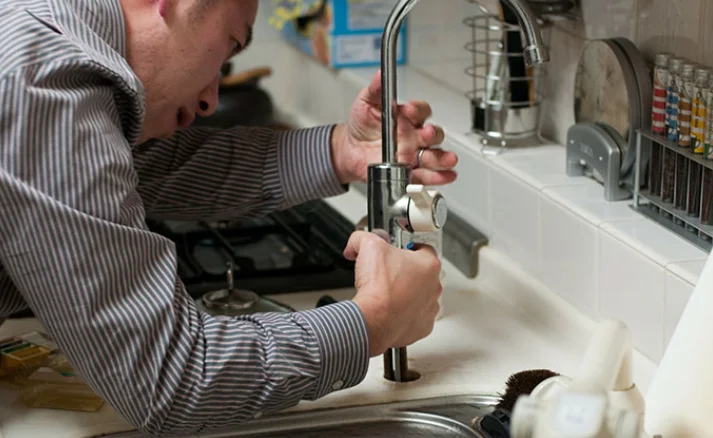Hard water is a common issue affecting many households, leading to various problems in plumbing systems, appliances, skin, and hair. Hard water contains high levels of dissolved minerals, mainly calcium and magnesium, which can significantly impact the efficiency and lifespan of pipes, water heaters, and other plumbing fixtures. Over time, these minerals accumulate as scale, causing clogs, reducing water flow, and increasing the likelihood of appliance failure. We will explore how Pasadena plumbers assess and resolve hard water problems, from identifying the issue to implementing effective solutions that restore water quality and protect plumbing systems.
Identifying Hard Water Issues in the Home
The first step in addressing hard water problems is identifying the signs that indicate its presence. Plumbers use various methods to assess water quality, including visual inspection and water testing. Common signs of hard water include the buildup of white, chalky stains on faucets, showerheads, and tiles, which result from mineral deposits left behind as the water evaporates. Plumbers may also check for limescale buildup inside pipes, which can significantly reduce water flow over time. Additionally, hard water can affect the performance of water-using appliances such as dishwashers, water heaters, and washing machines. A plumber may notice inefficient operation or shorter lifespans of these appliances due to mineral buildup. Water testing is typically conducted using a water hardness test kit or sending a sample to a lab for analysis. This test measures the concentration of calcium and magnesium ions in the water, helping plumbers determine the severity of the issue.
Assessing the Impact on Plumbing Systems
Once hard water is identified, plumbers assess its impact on the plumbing system. Over time, the minerals in hard water can cause significant damage to pipes, leading to clogs, reduced water flow, and even pipe corrosion. Limescale buildup inside pipes can restrict water flow, making it harder for water to travel through the system. Plumbers may use various diagnostic tools to inspect the inside of pipes, including cameras or borescopes, to check for signs of mineral buildup and corrosion. In some cases, plumbers may also check the pressure in the system to see if there is a noticeable decrease, which can be a sign of blockages caused by scale accumulation. If the problem is extensive, the plumber may recommend pipe replacement or cleaning to restore proper flow. Additionally, hard water can damage water heaters, as mineral deposits accumulate on heating elements, reducing efficiency and potentially causing malfunctions. A plumber may inspect the water heater for signs of mineral buildup or rust and determine whether a cleaning or replacement is necessary.
Choosing the Right Solution for Hard Water
Once the severity of the hard water problem is assessed, plumbers can recommend the most suitable solution. There are several methods for resolving hard water issues, and the choice of solution depends on the household’s specific needs and the extent of the damage caused by the minerals. One common solution is the installation of a water softener. Water softeners exchange calcium and magnesium ions with sodium ions, effectively removing the minerals responsible for hard water. Plumbers can install water softeners at the point of entry to the home, ensuring that all water entering the household is softened. This helps protect plumbing fixtures, appliances, and pipes from further damage and improves the overall water quality for drinking, cooking, and bathing. Another option is a descaler, which alters the chemical composition of the minerals in the water, preventing them from forming scale in pipes and on appliances. Descalers are typically installed on the main water line and are often chosen when a water softener is not desired due to salt or the need for maintenance.
The Importance of Professional Plumbing Assistance
While DIY solutions for hard water problems may seem appealing, it is important to consult a professional plumber to ensure the issue is properly assessed and resolved. Plumbing systems are complex, and improper handling of hard water issues can lead to further damage or inefficiency. Plumbers are trained to identify the signs of hard water problems, assess the plumbing system’s condition, and recommend the most appropriate solutions. They also have access to specialized equipment and tools that can help diagnose and fix issues quickly and effectively. By working with a plumber, homeowners can ensure that their plumbing systems are protected and that hard water problems are addressed in a way that restores water quality and efficiency. Plumbers can also provide valuable advice on ongoing maintenance and preventive measures to keep the hard water from causing future issues, helping homeowners maintain their plumbing systems long-term.
Hard water can cause various issues in a home, from damaged plumbing systems and appliances to reduced water quality and efficiency. Plumbers play a crucial role in identifying, assessing, and resolving these problems through careful inspection, testing, and implementing effective solutions. By understanding the impact of hard water on plumbing systems and choosing the appropriate treatment methods, homeowners can protect their plumbing and ensure the long-term functionality of their water-using appliances. Regular maintenance and preventive measures also help mitigate the effects of hard water, ensuring that homes remain free from scale buildup and other related issues. Working with a plumber is essential to address hard water problems effectively and ensure the plumbing system stays in top condition.

Shannon Reyes is a seasoned writer with a knack for crafting engaging blogs on a variety of service industries, including plumbing, cleansing, moving, pest control, and roofing. With a keen eye for detail and a passion for helping readers navigate complex topics, Shannon brings her expertise to life through informative and accessible content.











